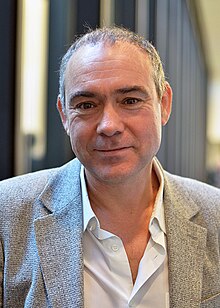Christophe Boltanski | |
|---|---|
 Christophe Boltanski at salon du livre du Mans in 2015 | |
| Born | 10 July 1962 |
| Citizenship | French |
| Occupation(s) | journalist, writer, novelist |
| Employer(s) | Libération, Le Nouvel Obs |
| Parent | Luc Boltanski |
| Awards | Prix Bayeux-Calvados des correspondants de guerre 92000), Prix Femina (2015), Prix des prix littéraires (2015) |
| Signature | |
| | |
Christophe Boltanski (born 10 July 1962 [1] ) is a French journalist, writer and chronicler. He was awarded laureate of the 2015 Prix Femina prize for his novel La Cache, [2] which is the basis for the film La Cache (The Safe House).